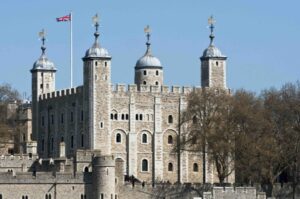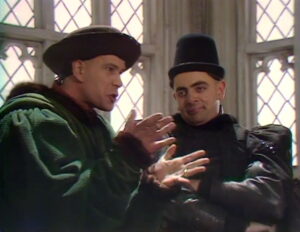Henry Holland
Duke of Exeter
Henry Holland - 3rd Duke of Exeter
 Henry Holland, born on27 June 1430, son of John Holland and Anne Stafford (ooo look another Stafford) sister of the Duke of Buckingham and she was also related by her first marriage to Richard of York. John, had fine credentials of his own being related to half-brother of Richard II.
Henry Holland, born on27 June 1430, son of John Holland and Anne Stafford (ooo look another Stafford) sister of the Duke of Buckingham and she was also related by her first marriage to Richard of York. John, had fine credentials of his own being related to half-brother of Richard II.
Succession
His father made sure that before he died he had set up his son with the title of Duke of Exeter and also the constable of the Tower. He unfortunately died early (suspiciously according to some of the rebels) in 1447.
Marriage
Before his father died, the 17 year old Henry was married to Anne of York (aged 8) the daughter of Richard of York. And it was in Richards care the King placed the young Henry. Although they were married it would be several years before the marriage was consummated and Anne Holland was born in 1461.
Mighty Prince the Duke of Exeter
Henry seemed to want to be his own master and didn’t sit in any faction or mould. Although never far from the kings side, the rumour was that the ship involved in the Duke of Suffolk’s murder was part of his fleet. When the rebels raised their bill of complaints, they noted that he was one of the guys that they trusted.
Remember to read this phonetically:
Also desiring his trewe Comyns that he woll voyde all the false progeny and afynyte of the Duke of Southefolke, the whiche ben opynly knowyn traitours, and they to be ponysshed after custome and lawe of the lond. And to take abowte hym a nobill persone, the trewe blode of the Reame, that is to sey the hye and myghty prince the Duke of Yorke, late exiled from our soueraigne lords presens of false traitour Duke of Suthffolke and his affinte, and take to yow the myghty prince the Duke of Excetter, Duke of Bokyngham, Duke of Northefolke, Erlys and barons of this londe: and then shall be the Richect Kyng cristen.
Also desiring his true commons that he will void all false progeny and affinity of the Duke of Suffolk, the which been openly known traitors, and they to be punished after custom and law of the land. And to take about him a noble person, the true blood of the realm, that is to say the high and mighty prince the Duke of Yorke, late exiled from our sovereign lords presence of false traitor Duke of Suffolk and his affinity, and take to you the mighty prince the Duke of Exeter, Duke of Buckingham, Duke of Norfolk, Earls and barons of this land: and then shall be the richest King christened.

When King Henry was due to ride out to meet the rebel s to hear their complaints, Exeter was at his side (although the King was dissuaded of going when they found out how many rebels were at Blackheath). The King arrested James Fiennes, Lord Say and Sele, he gave him over to Henry Holland as Constable of the Tower. When he asked Henry to release him, he refused, Its this fact of refusal that makes Henry a minor character in this story. Henry with Lord Scales was put in charge of the defence of London when the rebels arrived. A complex character!
Aftermath and later
After the rebellion, the King still trusted him and he was part of the commission which toured the South East to hear complaints and sit in judgement of rebels.
As he got older he became more “quarrelsome” and used excessive violence, especially when it came to the acquisition of land. He had several episodes being imprisoned but yet was by the Kings side and on the Lancastrian side. He was exiled in 1461 and his wife refused to go with him (as her brother was now King). At the restoration of Edward IV’s reign in 1471, he was placed in the Tower, where he once was constable.
Divorce
It was during this time, his Wife took the opportunity to divorce her husband for consanguinity(hence introduction regarding genealogy to past kings etc), to allow herself to marry her lover Sir Thomas St Ledger
Suspicious Death

In 1475, Edward releases him and takes him to battle in France. The idea that he might die in Battle and get rid of a problem for him was appealing, but peace broke out. On the journey back from France, he fell overboard and drowned. This reminds me of the BBC Blackadder comedy sketch, when they are discussing the spate of accidental deaths, “…Archbishop Wilfred slipping and falling backwards onto the spire of Norwich Cathedral.” Even a foreign ambassador reported that he was probably thrown overboard.
